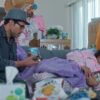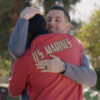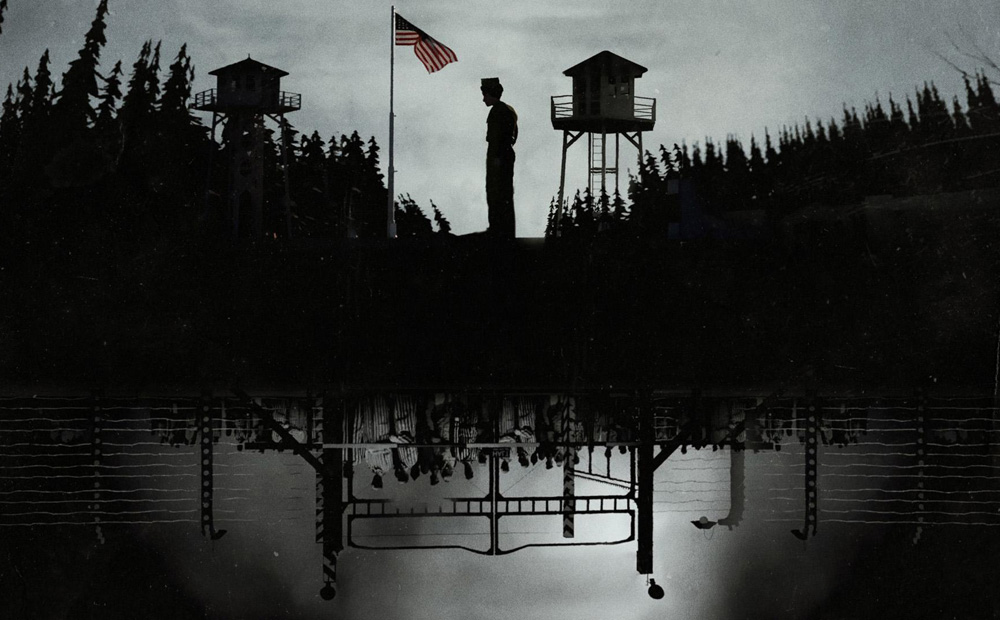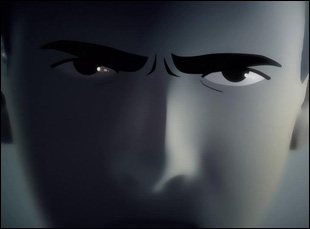When Daniel Sivan and Mor Loushy were approached with the recordings that would become the foundation for their latest work, “Camp Confidential: America’s Secret Nazis,” they surprised producers Benji and Jono Bergmann, who had presented them with the tapes from a National Park Service project about the Washington D.C.-based Fort Hunt Park, with their response.
“At first, we actually said, “We don’t believe you,” said Sivan, who with Loushy has made a habit of leaping at historical stories that seem too good to be true. “But they [insisted], ‘No, we actually have all these audio recordings that were uncensored from 2006.’”
Loushy and Sivan couldn’t resist listening to at least a little bit of the tapes at first, having discovered extraordinary new avenues into history from keeping their ears to the ground in the past, first with their 2015 film “Censored Voices,” which gave an entirely new dimension to Israel’s Six-Day War as soldiers confided their private thoughts about their participation into recorder, and the 2018 reconstruction of the Middle East peace talks of the 1990s in “The Oslo Diaries” that revealed what was really going on behind all the public posturing by Israeli and Palestinian leaders. Eventually, they would be entirely engrossed as audiences are likely to be by what they heard, with Fort Hunt Park built over a former U.S. military camp that had housed Nazis transported across the Atlantic and presumably held for their crimes as World War II was still unfolding in Europe. Or at least that was the impression that the soldiers, many of the Jewish faith, had been told when assigned to be their guards.
However, “Camp Confidential,” brought alive by first-hand testimony as much as vivid animation that recreates what it was like to be stationed at the location known only to the world as P.O. Box 1142, tells of American opportunism when these Nazis all held special skills as scientists and the goal of interrogations weren’t to suss out guilt or help with the war effort, but instead enjoin them to aid with their own technological advancements. With knowledge of this base classified for half-a-century, the revelations are shocking even now as the soldiers who were inspired to enlist to ward off evil speak of having to cater to the whims of their Nazi prisoners, perhaps leading to unexpected scientific breakthroughs and innovation but with the question of at what cost hanging over it.
With the short documentary premiering on Netflix as well as in New York this week at DOC NYC, Sivan and Loushy spoke about how they’ve uncovered yet another remarkable hidden history, yet why they would be the last to describe their work that way.
Daniel Sivan: It was just a year ago we were wrapping up “The Devil Next Door,” the series we did for Netflix about John Demjanjuk [a former Nazi prison guard who resettled in Cleveland], and we had a visit from Benji and Jono Bergmann, who were researching this story for over three years and when they told us about it, it started out by us saying, “No, we don’t want to face another story about the Holocaust. It really took such an emotional toll on us and it was just so sad working with these materials. It gives you nightmares.” But we started listening to [these recordings the Bergmanns found] and our jaw dropped because this camp actually existed during the Second World War [where] a bunch of Jewish refugees are guarding a few hundred Nazis next to Washington D.C. What could be crazier than that? Then when the story evolves and they’re not only interrogating these Nazis, but actually recruiting them, our mind was blown and we’re like, “Okay, we have to tell this story.”
Mor Loushy: When Daniel told me, “Look, there is a story and they took [the Nazis] to Lansburgh and Brother [Department Store] to buy brassieres in order to recruit them,” I told him, “I don’t believe it. I want to hear it with my own ears.” Then when we started listening to the interviews and hearing these stories of these Jewish refugees that escaped from Europe two years before that, some of them a year before from the Kristalnnacht and coming to the U.S. to find refuge and [enlisting in the army] then finding themselves not in Europe, not on the front, but in the heart of D.C., recruiting Nazis to the U.S., that was just unbelievable.
It blew my mind. And like “Oslo Diaries” and “Censored Voices,” this has to start with the audio. What’s it like figuring out how to bring this to life?
Mor Loushy: Yes, “Censored Voices” and “Oslo Diaries” were also very heavily based on voices and on shedding light on histories that people are not aware of and what drew us so much into the story that again, these are very, very personal stories of a big historical event that nobody knew about. Most of these refugees took this secret to their grave. They didn’t talk about it, they didn’t tell their wife, their children or their family about it, so we’re always drawn to these silent voices of these stories that people did not hear about them, so it was a similar process but of course, this time, we chose animation, which was a very good experience.
Daniel Sivan: We were looking for something that was very human and it’s very tough to do it with 3D animation because a lot of time is very pixellated. It has this sense of computer graphics and we wanted something that can give a bit of a feeling of something that communicates with the past, and we didn’t want it to be glossy at all. What really was the key point is that it’s a story about people — not about the grand scheme of the U.S. and Nazis and the war going on — but about these 18-, 19-year-old guys who are facing their worst enemy in the world and instead of taking vengeance in front of him and against him, he needs to slowly become his servant. So it was a really fun exploration of how can we make this as human and as engaging as possible [where] it’s a bit hand-drawn and [have the] feelings of it’s not real life — it’s a story being told. It’s a memory.
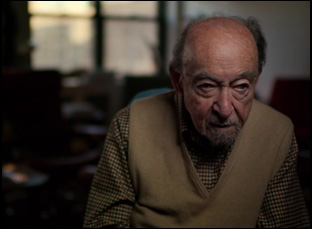
Daniel Sivan: It was amazing. All of those visuals that we found were actually from the personal archives of Peter [Wiess] and Arno [Mayer] and you can really see them posing in different places in the camp. There are some photos going around them in the National Archives [where] you can actually see the pool, which is mind-blowing. It’s like, “Oh my God, they actually have people in the pool.” And just this concept of this prison, which is actually this summer camp at a country club, is so disturbing and each time Benji and Jono would find another photo and show it to us, it really runs chills down your spine. Like if you search Google for Camp 1142 Field Post 1142 Bus, you’ll actually see the photo of that planked wood bus that was going on with no windows.
Mor Loushy: We saw, let’s say, 15 pictures from the camp and details [from the interviews] and I remember when we first saw, for example, the animated scene of them coming to the camp and seeing the camp for the first time, I really felt “Wow, they really brought it to life.” There was one still photo of this swimming pool, suddenly, it was alive and it was there and you really felt the story through the animation. And to hear all those hours of testimonies of people who are unfortunately not alive, only Peter and Arno are the only survivors – it was chilling. They thought they were starting as interrogators [of Nazis living in the U.S.], but suddenly, it shifted into recruiting them and letting them to feel good and anything in order for them to switch sides and to work for the U.S.
Was it difficult to figure out from the thousands of hours of audio what the story was?
Mor Loushy: From the moment we started hearing the interviews, it was very, very clear to us that this is a story of the relationship between the Jewish refugees and those Nazis. We decided it was a short, [which is] really our first, [because we could] do it very purely with only the interviews and stay inside the experience of the camp. That’s what we want to concentrate on – one location and the relationships in this camp. That was fascinating to us.
Did you know from the start of this that Peter and Arno were still alive?
Daniel Sivan: When Jono and Benji started this process, they didn’t know, but they found Arno and when we were going to film the interview, all four of us suddenly understood there is another person — Peter, [which] was like a discovery just a week before we started shooting. That was really a moment of happiness and excitement. Actually, Benji and Jono screened the film for him yesterday and he loved it. We’re now in Israel, they’re in New York and they sent us the photo and it was just so emotional seeing him look at his young self.
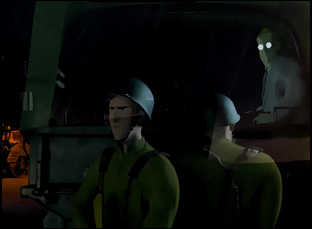
Daniel Sivan: For us, it really was so important because we’re dealing with the historic facts that are available [to anyone]. We never find any scoops hiding deep behind a rock. This information is available and people can just go on a searching spree, so each time we find a way to bring a story to life, we’re just excited about the fact that more people are going to hear [it] and this story was not forgotten or left aside or just discarded. This story was censored and it was hidden. The U.S. was ashamed of it and it was buried and bulldozed and burned for so many years, so for 50 years, the world couldn’t have access to this story. So for us, it’s not only exciting, but it’s a bit of a mission to bring this to light because all these people you can hear on the tapes, besides Peter and Arno, to our knowledge, had died, so they didn’t see this story come out and now we’re giving them a voice.
Mor Loushy: And [this raises] questions that are relevant not only to the past, but to the future of us as humans. Is a good cause worth doing bad things? Wernher von Braun and those scientists should’ve been tried for their crimes and instead they became heroes and this is history, so we think this film gets us thinking about our future and keeping a story that was silenced for so many years alive [makes us] very happy to bring it out there.
“Camp Confidential” will screen at DOC NYC at the Cinepolis Chelsea on November 10th at 9:35 pm and November 18th at 4:35 pm and available virtually on the DOC NYC platform from November 10th-17th. It is also now streaming on Netflix.

